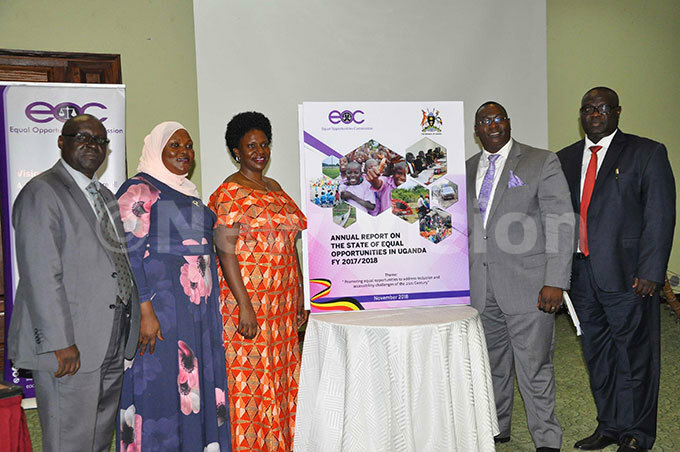Farmers register losses of up to 15% - new report
Nov 19, 2018
The study, released by the Equal Opportunities Commission (EOC) under the financial year 2017/18, indicates that some of the produce where farmers are making losses include; maize, sorghum, cassava chips, millet grain, green gram, groundnuts and pineapples.

AGRICULTURE
A new report has shown that Ugandans engaging in seasonal crop farming are yielding negative returns, hence making losses of up to 15% compared to the initial investment.
The study, released by the Equal Opportunities Commission (EOC) under the financial year 2017/18, indicates that some of the produce where farmers are making losses include; maize, sorghum, cassava chips, millet grain, green gram, groundnuts and pineapples.
Highlighting the state of equal opportunities in Uganda; particularly in employment under the informal sector, Evans Jemba, the EOC acting commissioner, compliance and enforcement said an average investment of sh3.5million yields farmers an average of sh2.9million after selling off the agricultural harvest.

Board members of Equal Opportunities Commission (Left to Right) Joel Cox Ojuko, Zaminah Malole, Chairperson Equal Opportunities Commission Sylvia Ntambi Muwebwa, Wafula Sirabo Patrobas and Mujuni Mpitsi, Pac Lawrence during the launch of 5th annual report on the state of equal opportunities in Uganda at Imperial Royale Hotel Kampala. Photo by Nancy Nanyonga
The loss in the initial investment, he said excludes individual effort.
"The above situation breeds more marginalisation in agricultural employment and puts farmers in harder financial situations, more especially those who obtain loans from money lenders and formal financial institutions," he said.
Jemba was speaking to stakeholders during the launch at Imperial Royale Hotel in Kampala on Wednesday.
Henry Kasamba, a maize farmer from Luwero district who was interviewed under the period of study said at the beginning of the season in March, he prepared 15 acres, bought improved seeds and carried out proper weeding.
Accompanied by the good weather, Kasamba harvested over 150 bags of maize, an equivalent of about 20,000kgs.
"However the prices of maize in the market are too low and this has forced me to sell a bag of maize at only sh20,000," he said.
The old price of a kg of maize between 2016/17 was sh800 whereas the current price for the same quantity is sh300.
However, the average unit cost for all the seven crops of focus was sh16,100 in the financial year 2016/17 and dropped to sh6,850 in 2017/18, translating into a 57% overall price decline.
The report noted that the most affected farmers were those dealing in sorghum and cassava chips whose decline was 75%, followed by those growing pineapples 70%, green gram 67% and maize 63%.
The above price fluctuations, according to Jemba, created more vulnerability among people who depended on farming as their main source of income.
According to the Uganda Bureau of Statistics, national household survey, 72% of Uganda's working population is employed in agriculture and its related activities.
With a working population of about 16.4 million people, this means at least 12 million people are directly engaged in agriculture.
Sylvia Muwebwa, the EOC chairperson, said whereas many Ugandans are venturing into the informal sector with majority of the informal businesses owned by youth, the informal sector still has limited access to formal financial institutions with 78% obtaining capital from either a family member or their own saving.
She listed lack of finances, limited market, lack of inputs for mass production, high tax rates and poor quality roads leading to high cost of transportation, as the major challenges constraining formalization of informal businesses in Uganda.
The above notwithstanding, Muwebwa said the establishment of modern markets by Government, in different parts of the country as part of the initiatives to create both market for local produces and employment was good.
"Market vendors were not only satisfied with the level of sensitisation on availability of market stalls but also the transparency in the selection process and inclusion of all categories of people," she said.
Gender minister Janat Mukwaya said the findings in the report will enable different stakeholders lay strategies to ensure equal opportunities for all.
She said whether the markets for produce were shrinking, the country is still assured of food.
